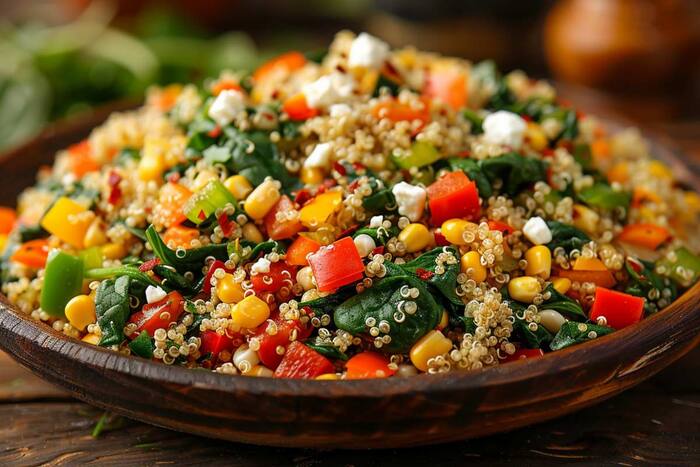
By clicking “Accept All Cookies”, you agree to the storing of cookies on your device to enhance site navigation, analyze site usage, and assist in our marketing efforts Cookies Policy.

Quinoa, often referred to as a “superfood,” offers numerous health benefits that make it a valuable addition to a balanced diet. Here’s a detailed look at the benefits of eating quinoa:
Quinoa is one of the few plant-based foods that provides all nine essential amino acids, making it an excellent protein source for vegetarians and vegans. This quality makes it particularly beneficial for muscle repair and growth, as well as overall bodily functions.
Quinoa is rich in dietary fiber, which aids in digestion and helps maintain a healthy gut. A fiber-rich diet can promote regular bowel movements, reduce the risk of constipation, and may even help lower cholesterol levels.
Quinoa is packed with essential nutrients, including magnesium, iron, B vitamins, potassium, calcium, and vitamin E. These nutrients play vital roles in various bodily functions, from energy production to maintaining bone health and supporting the immune system.
Quinoa has a low glycemic index, which means it can help regulate blood sugar levels. This is particularly beneficial for individuals with diabetes or those looking to manage their weight, as it can promote stable energy levels and reduce cravings.
For those with gluten intolerance or celiac disease, quinoa is an excellent gluten-free grain substitute. It can be used in place of traditional grains like wheat, barley, and rye, making it versatile for a variety of dishes.
Quinoa contains several antioxidants, including quercetin and kaempferol, which can help protect cells from oxidative stress and inflammation. These antioxidants may also contribute to reduced risk of chronic diseases such as heart disease and cancer.
The healthy fats found in quinoa, primarily unsaturated fats, along with its high fiber content, can contribute to improved heart health. Regular consumption may help lower cholesterol levels and reduce the risk of cardiovascular diseases.
Quinoa is nutrient-dense and filling, which can help control appetite and reduce overall calorie intake. Its combination of protein and fiber can help you feel satisfied longer, making it easier to maintain a healthy weight.
The presence of B vitamins in quinoa, particularly vitamin B6, plays a crucial role in energy metabolism and the conversion of nutrients into energy. This can be beneficial for those looking to boost their metabolism and enhance overall energy levels.
Quinoa is a good source of several minerals essential for bone health, including magnesium, phosphorus, and calcium. Consuming quinoa can help support bone density and strength, reducing the risk of osteoporosis.
Beyond its health benefits, quinoa is incredibly versatile and easy to prepare. It can be used in salads, soups, stir-fries, and as a base for grain bowls. It cooks quickly and has a pleasant, nutty flavor that complements a wide variety of dishes.
The antioxidants and anti-inflammatory properties of quinoa may contribute to healthier skin. Some studies suggest that consuming quinoa can help reduce the risk of skin conditions and promote overall skin vitality.
For breaking news and live news updates, like us on Facebook or follow us on Twitter and Instagram. Read more on Latest Dishes News on India.com.